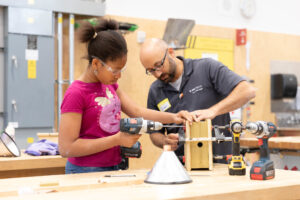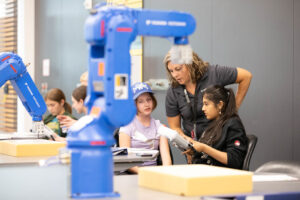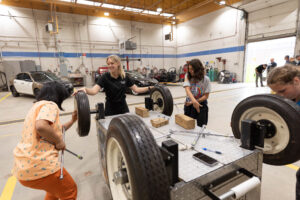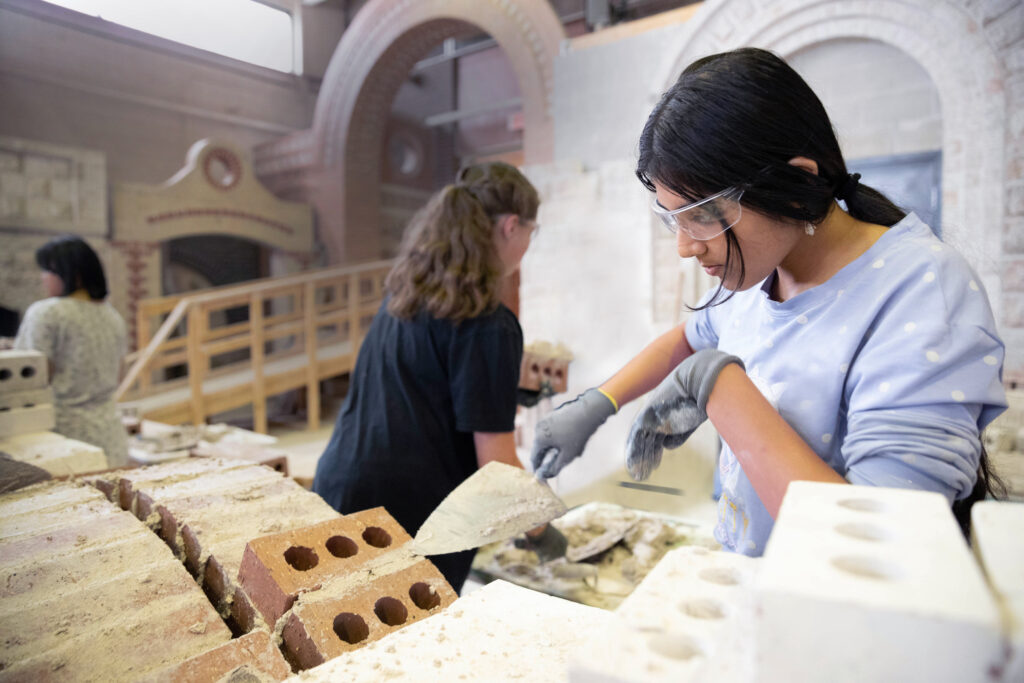RRC Polytech trades camp takes early approach to equal representation
As Manitoba continues to grow, there’s no question that the demand for skilled tradespeople is as high as its ever been.
According to the province’s labour gap statistics, trades such as automotive service technicians, carpenters, electricians and construction labourers are some of the most in-need career paths over the next five years.
Trades, though, can be a male-dominated space. According to a 2020 study by BuildForce Canada, just five per cent of the 1.1 million trades people in Canada identify as female. While this is a significant increase from where the industry was 10 years ago (3.7 per cent in 2008), it shows just how important equal representation and creating space is when it comes to young women entering trades.
Enter the Girls Exploring Trades and Technology camp, or GETT. Started by RRC Polytech in 1999, GETT is a summer camp at the College’s Notre Dame Campus where instructors and staff help introduce young girls aged 12 to 14 to a variety of trades — free of charge.
 “The girls get exposure to a whole lot of different non-traditional career options for them,” says Christina Lambert, who has been running the camps since 2006.
“The girls get exposure to a whole lot of different non-traditional career options for them,” says Christina Lambert, who has been running the camps since 2006.
In a whirlwind four days, camp participants are introduced to plumbing, woodworking, cabinetmaking, welding, robotics, transportation, bricklaying, and more. At the end of their camp experience, each participant brings home a project made using experience earned in the camp: a desk lamp built with iron pipe.
Reaching girls in their tweens and teens is critical for starting their path into a trades career, Lambert emphasizes. That’s because when they enter high school, they’ll need to select courses that set them up for success in vocational training or at a polytechnic, depending on where they choose to go.
“At that age, they start deciding what kind of classes they want to take in high school, and we want to impress upon them the importance of math and science,” she says. “When we started running the camps, we were finding that young women weren’t too excited about math and science — so we make these camps exciting and hopefully open different doors for them. There’s been a fantastic response.”
GETT was revamped in 2019 to give more of an introduction across trades, with 32 spots available for young girls to participate across two weeks. Lambert says the College does everything possible to match participants with female-identifying instructors as well, so that a role-model relationship could potentially bloom.
 The free aspect of the camps is also critical, because it means young girls of any means can take part and see their future in trades.
The free aspect of the camps is also critical, because it means young girls of any means can take part and see their future in trades.
“Our camp is totally free because we don’t want to exclude those students who may not be able to afford to come to camp,” says Lambert. “We are adamant on this, simply because we want students from different financial backgrounds.”
The success of GETT can be seen when campers return to the RRC Polytech campus as high school graduates, entering a trades program that will kickstart their career.
“I’ve been stopped in the hallways by students who’ve returned and taken a trades program, and they’ll ask, ‘Do you remember me?’” laughs Lambert.
“Sometimes I do, sometimes I don’t — there are so many campers over the years! — but it’s so rewarding to see and hear that. Any time you can introduce trades training to students at a young age, it’s a benefit.”
Manitoba’s trades industry sees the benefit too, with many reps becoming sponsors of GETT to encourage new projects and ensure — even at these introductory levels of learning — that girls can see where the industry is at today.
 “Industry needs people and they’re always happy to help us out,” says Lambert.
“Industry needs people and they’re always happy to help us out,” says Lambert.
In the future, it’s hoped that GETT can expand its 32 spots slightly so more girls can participate — this past year, the camp received 140 total applications. By returning to the drawing board every year, the camps can also ensure they’re right on the cutting edge.
“We go back to our instructors and ask what we can add to vary the experience. A couple years ago, we added bricklaying, as an example. Every year, we try to vary it so it’s not always the same.”
Profile by John Gaudes (Creative Communications, 2012)

